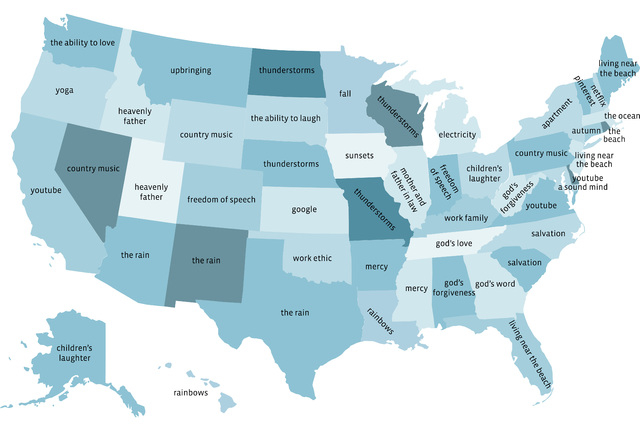What is your home state most thankful for?
Most of us have seen them, and a few of us have taken part: the ubiquitous Facebook gratitude challenges that require participants to post what they’re grateful for and ask friends to do the same.
The popularity of the challenge has led to a treasure trove of data for Facebook to play with and offers a unique look at the face of American gratitude. In an analysis released this week, Facebook’s data scientists dug through anonymized posts from English-speaking Facebook users around the United States to find what people were most often thankful for, and the most unique items by state. The most popular results are entirely unsurprising:
- Friends
- Family
- Health
- Family and friends
- Job
- Husband
- Children
- The roof over my head
- Life
- Music
What’s more interesting is what people are thankful for that is distinctive for only a few states. Some play to stereotypes: In Oregon, yoga topped the list, and in Utah, Idaho and the South, religious topics were most popular.
Some patterns would likely change if the gratitude challenge took place at a different time of year: The South and Midwest overwhelmingly favored weather-related topics like the rain and thunderstorms, which might not be on people’s minds come June.
Geography also played a role in gratitude: People in coastal states are grateful to live near the beach, for example. In New York, where space is scarce, people were most grateful for their apartments.
Two states shared gratitude for country music: Nevada and Pennsylvania. Michigan favored electricity and Kansas liked Google. South Dakota was grateful for the ability to laugh, while Alaska said thanks for children’s laughter. Illinois, weirdly, was most grateful for in-laws.
Facebook pointed out that the challenge was done mostly by women, and every topic was mentioned more often by women than men save two: girlfriends and wives. Most people who took part were between 28 and 55 years old and were grateful for opportunities early in life and health later on.
You can check out Facebook’s full analysis here.















